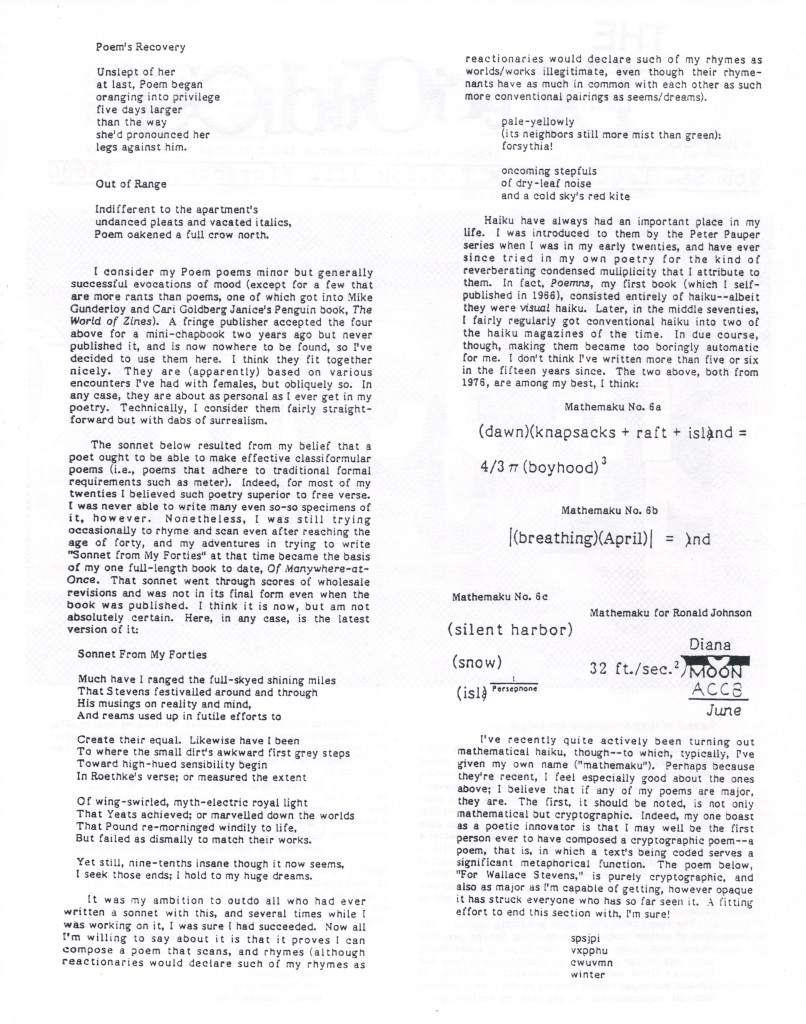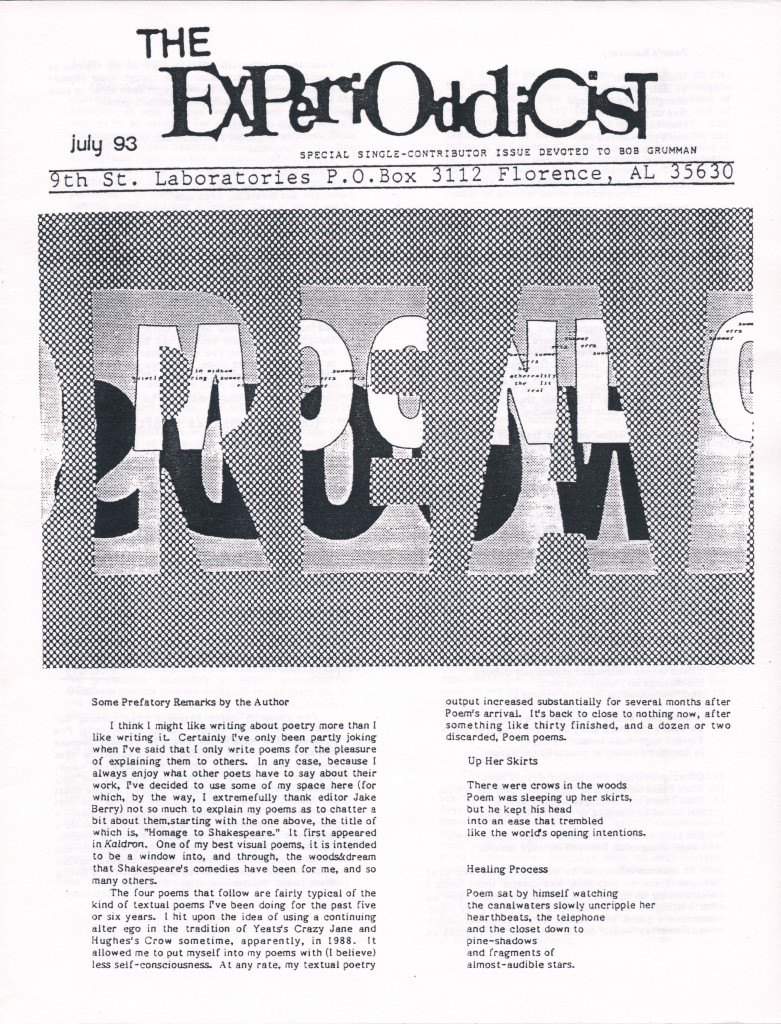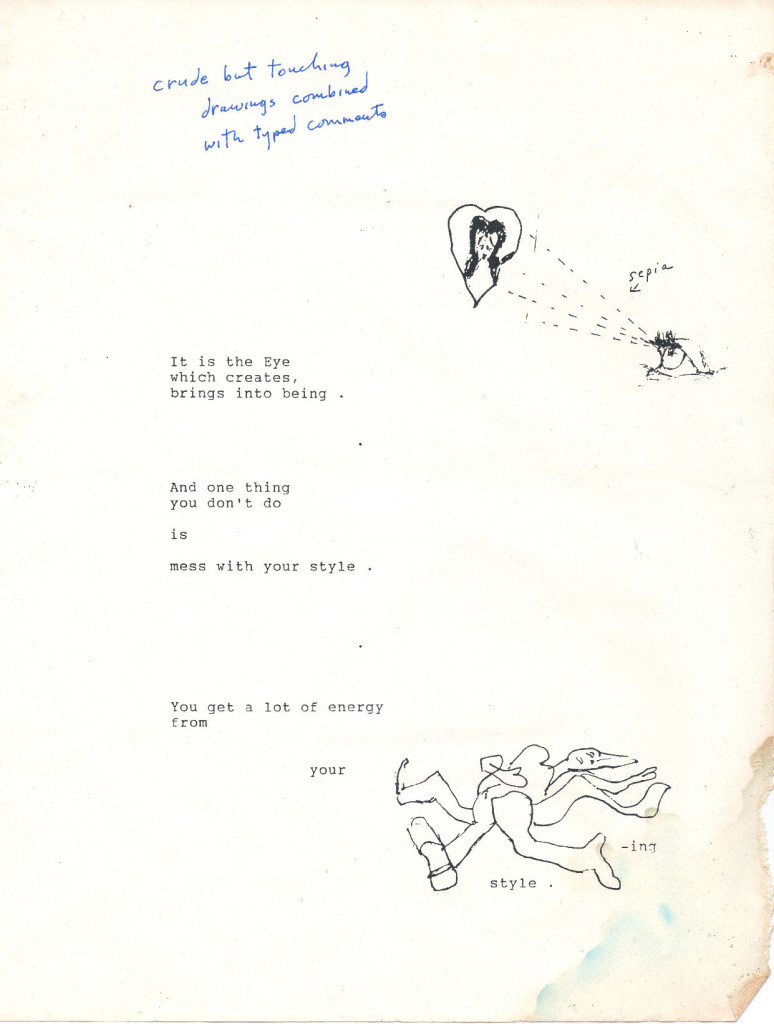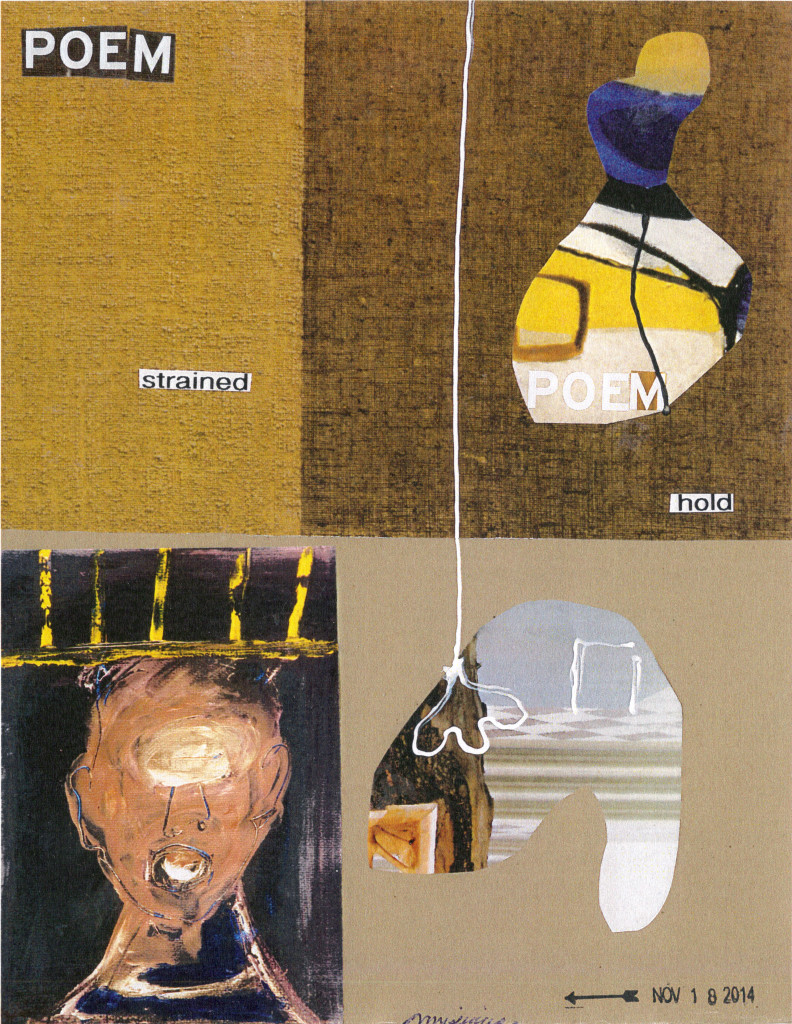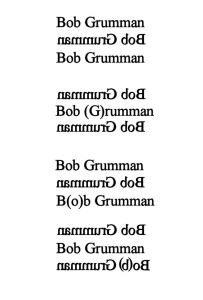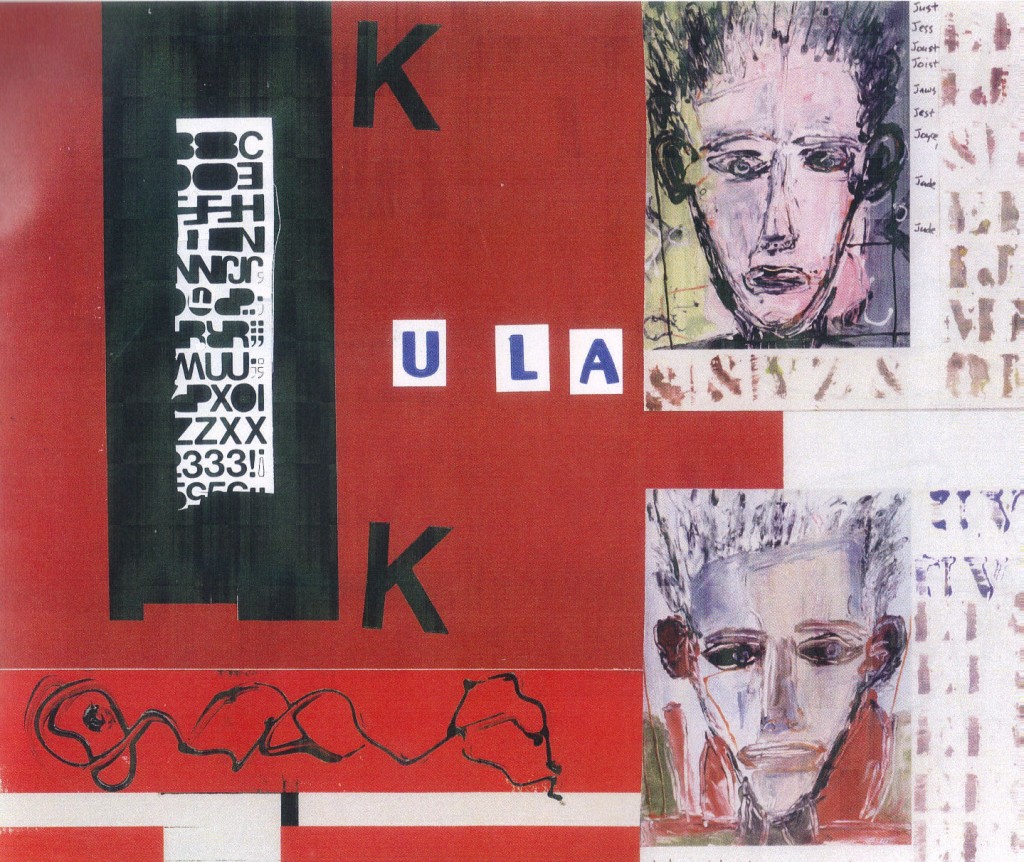Archive for the ‘Linguexpressive Poetry Specimen’ Category
Entry 1753 — My 1st Full-Scale Hero in Poetry
Sunday, March 15th, 2015
In my little-selling Of Manywhere-at-Once, Keats was one of the six canonized poets I wrote a chapter about. Yeats, Pound, Stevens, Cummings and Roethke were the others. I suddenly realize that Stevens was the last of them to become a hero in poetry of mine–around 35 years ago. None since. Nor, that I can think of, any literary heroes of any kind since then. Heroes of verosophy? Perhaps. More likely, no: because I don’t think I have any genuine verosophical heroes. The one who comes closest is Nietzsche, but I consider him a literary hero. I’ve greatly admired a lot of verosophers–Archimedes, Aristotle, Darwin, Newton, Dalton, Faraday, to mention a few–but not the way I’ve idolized and drenched myself in the works and lives of writers like Keats. And a number of visimagists like Cezanne and Klee. But no composers. I guess the reason for this is obvious: I’ve become a writer, and (to a degree) a visimagist, but not a composer. I consider myself a verosopher, but one unlike any I’m familiar with, except–possibly–Pierce.
It may be that I’ve had no cultural heroes since my thirties due to some flaw of mine, but I suspect one grows . . . not beyond, but off to the sides, of hero-worship. Into too much of one’s own work toward becoming a cultural hero oneself to have as much time new ones. One also will eventually have a number of contemporaries to take the place of heroes, albeit differently–as co-heroes rather than as worship-worthies.
In any case, in my chapter about Keats, I spent over four pages on his sonnet to Chapman’s Homer, which was one of the few poems I’d memorized by then (around the age of 18)–and, for that matter, one of the few I have ever memorized. I wish I’d memorized many more, but I also wish I knew more than one language. I tend to think I’ve stored all the data I’ve been capable of (as has everyone), so it doesn’t bother me inordinately. Just a little wishfulness that a few things were not impossible. Except when I’m in my null zone and realize that nothing really good is possible.
I only memorized one other poem by Keats (also at around the age of 18):
When I have fears that I may cease to be Before my pen hath glean'd my teeming brain, Before high-piled books, in charactry, Hold like rich garners the full-ripen'd grain; When I behold upon the night's starr'd face, Hugh cloudy symbols of a high romance, And think that I may never live to trace Their shadows, with the magic hand of chance; And when I fear, fair creature of an hour, That I may never look upon thee more, Never have relish in the faery power Of unreflecting love!--then on the shore Of this wide world I stand alone and think Till Love and Fame to nothingness do sink.
Note Keats’s glorification of “high-piled books” here and another poet’s accomplishment in the Chapman poem–his raw young poetic ambitions as a young man obvious, so just the thing to capture me at 18–besides the level of the writing. Although poetry was never at the center of my writing ambitions until the past decade or so, by default.
(Aside: after going through my edition of Keats’s poems to make sure I remember the poem above correctly–actually to fix parts I knew I hadn’t–the level of his writing bothered me: in less than 26 years he composed more effective poems than I have in almost 75. This is not false humility. But I feel I have added to the poet’s tool-kit, which he did not, and ranged beyond poetry into a theory pf psychology, which he did not, and which I think beyond doubt an accomplishment of sorts. Yes, competitiveness is an enduring part of my character. I still consider more a virtue than not.)
Okay, back to my dictum about reading poetry to the extent that you devour everything you can of the life and work of at least one of them as I devoured Keats. This resulted in several (but not a flood) of defective poems until I wrote the following in my twenties:
I yearn to run madly into the brush till a wild complexity of chance-created life has cut me off from mortals' petty strife I long to be where swift winds fill with the joyful fundamental music of woods & a gloriously unsymmetrified uproar of grass and violets and weeds and rocks covers every open field and curving hill. I long to stand at the sweet dense core of nature studying the clouds' slow schemes till the regulated world has blurred into nothingness & I am in leagues with dreams..
This is a fair derivative poem, I now think, but indicative only that when I wrote it, I had reached the basement of the poet’s vocation–thanks to all the reading I did. I’m afraid I have to admit that this lesson of mine isn’t much of a lesson, for if you need someone urging you to read poems and writings about poets before you’ll do it, all the reading you do will be a waste of time for you. I did the reading I did because I had to. and I had made a hero of Keats I had to find out as much as possible about, because of my genes, which made me search for a hero, then in effect become a sort of apprentice of his. The real lesson is that you should save time by dropping the idea of becoming a poet if you aren’t already automatically doing this. I suppose a minor implicit value of the lesson is to confirm you in your vocation if you have found your Keats–and encourage you to keep going if you have not, but are deeply involved with some kind of poetry.
.
Entry 1752 — Break-Time
Saturday, March 14th, 2015
I was hoping to continue my lesson with an entry as good as I feel my one yesterday (mostly) was, but got involved in a duel of interpretations of Shakespeare’s Sonnet 24 with Paul Crowley at HLAS. I still was planning to come here and work up a storm but Shirley took care of that. Just as I finished my post for Paul and was about to cut&paste a copy of it in the flash drive I use for things like it, she hopped up on my computer desk, casually walked across my keyboard, then hit the floor again and walked out of the room. In the process, she deleted everything in my post. So I have to do it all over again. I need to because I feel I said a few good things about the poem–and several important things about my discussion of it, which I first called an “explication” but which was not quite that, but–I eventually concluded–the beginning of what I call a “pluraphrase,” and now to make for the poem. So maybe Shirley helped me.
As for the lesson under way, I found the poem of mine that I thought, and am still pretty sure, was the first poem I wrote that, as I put it in Of Manywhere-at-Once, I thought anything of:
I yearn to run madly into the brush till a wild complexity of chance-created life has cut me off from mortals' petty strife I long to be where swift winds fill with the joyful fundamental music of woods & a gloriously unsymmetrified uproar of grass and violets and weeds and rocks covers every open field and curving hill. I long to stand at the sweet dense core of nature studying the clouds' slow schemes till the regulated world has blurred into nothingness & I am in leagues with dreams.
* * *
The “nothingness” is from the sonnet by Keats that ends, “. . . then on the shore/ of the wide world I stand alone and think/ Till Love and Fame to nothingness do sink.” To make sure my lesson has a good poem in its entirety in it, I will quote the Keats poem in full in it. He’s been dead long enough for the imbecilic copyright laws to allow me to do that.
One other thing I have to report is that I came up with a term for “haiku-sensitivity,” which has come to seem too specific for what I want a term to represent. “Minificance,” (mih NIH fih kehnts) is the new term–to represent “a sensitivity to something in poetry of minimlistic significance.” “Haiku-sensitivity” would be a subset of this.
.
Entry 1669 — “A Bukowski Poem”
Monday, December 22nd, 2014
Did too much busywork in my practiceptual awareness today to be able to provide anything more here than a poem of mine I just came across that was in Harry Burrus’s O!!Zone 98, one of a series of O!!Zones that featured a lot of good work, much of it at a higher level than my poem–which isn’t to say that my poem ain’t pretty good. I had been writing Poem poems by 1998, so am not sure why this one wasn’t one. Possibly I later put Poem into it. If not, I may yet.
A Bukowski Poem
Because it’s been nearly a
year since I last wrote
anything remotely like a poem I’ve
decided to try my
hand at just jotting down
what would be unpunctuated
agrammatical prose except
for its linebreaks what I
call a Bukowski Poem after its
inventor William Carlos O’Hara it might
be fun and who knows it
might also get me going
again or even turn out worth
while of itself in a minor
way as such poems can for
instance if after awkwarding
to the final drab of flatness you go
for just a little more like
say the alley side
of a North Hollywood delicatessen
awning just the way the shade’s
turned its red to rust
can by contrast bridegroom
a reader to oceanic
expansions at which point you
should end your poem unless you go
in for anti-climaxes which can
be effective too.
.
Entry 1566 — “View from a Small Bridge”
Wednesday, September 10th, 2014
View from a Small Bridge water water rippling nowhere in particular but everywhere in general
This poem is based on my crossing a small bridge over a canal and for some reason finding the canal water especially restful. I thought out a haiku about it that included the present title of the poem and its first three lines, in slightly different words. Then I added “but everywhere in general”–mainly, I have to admit, because it gave the poem, I thought, a feeling of portentously mysterious but essentially vacuous depth. But I’ve gradually come to think it also an answer to my wondering where the water would ripple if not to nowhere. So it makes rational sense once one considers where water might go when made more than water (or the word , “water,” made more than a straight-forward denotation).
.
Entry 1549 — Translation Translation by Google
Monday, August 25th, 2014
I wasn’t sure what poem of mine was the bottom one in the set of Hungarian versions I posted yesterday, so had Google translate “vecen.” It gave “plumbing” for that. I thought the poem concerned was probably one I remembered with “toilet” in the title but couldn’t find it in my book, Of Poem (dbqp press, 1995), which I thought all three of my poems were from. So I had the first line translated. “Verse engineering sectors during?” That didn’t help. By then, however, I thought it’d be fun to have Google translate the whole poem back to English and put the result here:
The Toilet
Verse engineering sectors during
almost bllinding certainty recognize
o the greatest lines in the poem
the history of the universe.
Kuncognia had to, because he thought
how much
hold for what everyone
I admit that.
By adding “a” before “vecen,” I got an accurate translation of the title, but most of the rest of the text was a bit off. Close enough, however, for me to find the poem in my second collection of Poem poems, Poem Demerging (Phrygian Press, 2010):
On the Toilet
Between movements, it occurred to Poem
with an almost bllinding certainty
that his were the most superb works of any art
or science
in the history of the cosmos.
He chuckled as he thought of how long
it would take the rest of the world
to realize this.
Much thanks to Geof Huth and Arnold Skemer for publishing, respectively, Of Poem, and Poem Demerging.
.
Entry 1357 — “Still Another Definition”
Friday, January 31st, 2014
The poem below is on the page in Of Manywhere-at-Once just after the one (most of) my Stevens poem is on:
The next page had the rest of the paragraph above: “. . . techniques that were, and are, important to me. But I decided the statement should be trying its words on everything, not just certain vivid particulars. Anyway, I took much of the offbeat language out.”
.
Entry 1205 — The Experioddicist, July 1993, P.2
Friday, September 6th, 2013
Entry 1204 — The Exerioddicist, July 1993, P.1
Thursday, September 5th, 2013
While looking for a poem for use in my Scientific American blog, I came across the following, an issue of Jake Berry’s 4-page The Experioddicist from July 1993 that was entirely devoted to Me:
I think it pretty danged fine, and not entirely self-centered, for it has criticism of material by others. I hope that by holding down the control button and clicking the + button, you can get an enlargement you can read. My next three blog entries will have the other three pages–and give me extra time to work on other things.
.
Entry 1035 — Scrap from a Critic’s Life
Thursday, March 7th, 2013
I was really groping for something to put in this entry. I didn’t really feel blah so much as empty. So I went to a carton I’ve been dumping various literary materials in that I don’t know what to do with–or hadn’t until a few days ago, when I suddenly realized I could put each item in one of the fifty new hanging file folders I recently got, and put those into the two empty filing cabinet drawers I’ve had available since the last time I put mine house in order, to a slight degree. On the top of the things in the carton I found two papers–from ten or more years ago, I’m sure. On them I’d written notes–apparently for a review of what seem to be two poems that are also on the papers. I don’t know what happened to the review, if there was one, or whom the poems (and the nifty sketches illustrating it) were by. Maybe someone will recognize them and let me know. Meanwhile, they will take care of this entry–and tomorrow’s, I just decided!–as what some may find interesting as materials from the life in process of a disorganized critic.

